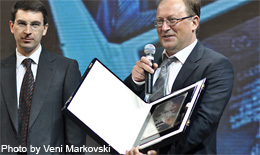

 Artificial intelligence is transforming Africa's informal economy by improving access to finance, optimizing business operations, and helping small-scale entrepreneurs transition into the formal sector, despite challenges such as digital illiteracy and infrastructure gaps.
Artificial intelligence is transforming Africa's informal economy by improving access to finance, optimizing business operations, and helping small-scale entrepreneurs transition into the formal sector, despite challenges such as digital illiteracy and infrastructure gaps.
 Around the world, communities are racing to close the digital divide. From fiber deployments in rural areas to affordable smartphones and digital skills training, the goal is clear: connect the unconnected. But as we pursue that goal, a deeper question emerges that demands just as much urgency as infrastructure: When people get online, can they actually participate in the digital world?
Around the world, communities are racing to close the digital divide. From fiber deployments in rural areas to affordable smartphones and digital skills training, the goal is clear: connect the unconnected. But as we pursue that goal, a deeper question emerges that demands just as much urgency as infrastructure: When people get online, can they actually participate in the digital world?
 For companies with global aspirations, Russian has long been considered a "must support" language. These days, that is no longer the case. But even before Putin decided to invade Ukraine, the Russian language had been slipping, ever so slightly, in global website support. While support for Ukrainian has been steadily rising. I’ve been tracking the languages supported by the leading global brands for nearly 20 years and...
For companies with global aspirations, Russian has long been considered a "must support" language. These days, that is no longer the case. But even before Putin decided to invade Ukraine, the Russian language had been slipping, ever so slightly, in global website support. While support for Ukrainian has been steadily rising. I’ve been tracking the languages supported by the leading global brands for nearly 20 years and...
 Earlier this year, the Internet Engineering Task Force’s (IETF’s) Internet Engineering Steering Group (IESG) announced that several Proposed Standards related to the Registration Data Access Protocol (RDAP), including three that I co-authored, were being promoted to the prestigious designation of Internet Standard. Initially accepted as proposed standards six years ago, RFC 7480, RFC 7481, RFC 9082 and RFC 9083 now comprise the new Standard 95. RDAP allows users to access domain registration data and could one day replace its predecessor the WHOIS protocol.
Earlier this year, the Internet Engineering Task Force’s (IETF’s) Internet Engineering Steering Group (IESG) announced that several Proposed Standards related to the Registration Data Access Protocol (RDAP), including three that I co-authored, were being promoted to the prestigious designation of Internet Standard. Initially accepted as proposed standards six years ago, RFC 7480, RFC 7481, RFC 9082 and RFC 9083 now comprise the new Standard 95. RDAP allows users to access domain registration data and could one day replace its predecessor the WHOIS protocol.
 A recent study carried out by Governance Primer on behalf of the Universal Acceptance Steering Group (UASG) identified trends in the acceptance of all domain names in software hosted at Github, the largest open-source repository globally. This research builds on top of previous efforts aimed at identifying the underlying issues that result in problems when different applications need to handle Internationalized Domain Names (IDNs) and new gTLDs, particularly when it comes to email addresses.
A recent study carried out by Governance Primer on behalf of the Universal Acceptance Steering Group (UASG) identified trends in the acceptance of all domain names in software hosted at Github, the largest open-source repository globally. This research builds on top of previous efforts aimed at identifying the underlying issues that result in problems when different applications need to handle Internationalized Domain Names (IDNs) and new gTLDs, particularly when it comes to email addresses.
 One of the major takeaways from the Web Globalization Report Card is the importance of providing "front doors" to your localized websites. These doors begin with the addresses themselves, which may not include the .com domain. In fact, I'd recommend that most localized websites not use the .com domain, as this is an overloaded domain. This article looks at the many ways brands are creating more localized addresses, beginning with country code top-level domains (ccTLDs).
One of the major takeaways from the Web Globalization Report Card is the importance of providing "front doors" to your localized websites. These doors begin with the addresses themselves, which may not include the .com domain. In fact, I'd recommend that most localized websites not use the .com domain, as this is an overloaded domain. This article looks at the many ways brands are creating more localized addresses, beginning with country code top-level domains (ccTLDs).
 Back in 2014, to foster innovation and to better the choice in domain names, ICANN introduced new generic top-level domains through its New gTLD Program. It was a monumental move that enabled businesses, individuals, and communities across the globe to mark their presence on the Internet. Allowing users to be present digitally in their chosen language (non-ASCII characters and scripts) gave opportunities to local businesses, civil societies, and governments to better serve their communities.
Back in 2014, to foster innovation and to better the choice in domain names, ICANN introduced new generic top-level domains through its New gTLD Program. It was a monumental move that enabled businesses, individuals, and communities across the globe to mark their presence on the Internet. Allowing users to be present digitally in their chosen language (non-ASCII characters and scripts) gave opportunities to local businesses, civil societies, and governments to better serve their communities.
 On March 13, 2019, I published an article on CircleID, Portrait of a Single-Character Domain Name, that explored the proposed release and auction of o.com, a single-character .com domain name that was registered in 1993 and assigned to the Internet Assigned Numbers Authority (IANA) by Dr. Jon Postel. Although the National Telecommunications and Information Administration (NTIA) has since raised serious objections...
On March 13, 2019, I published an article on CircleID, Portrait of a Single-Character Domain Name, that explored the proposed release and auction of o.com, a single-character .com domain name that was registered in 1993 and assigned to the Internet Assigned Numbers Authority (IANA) by Dr. Jon Postel. Although the National Telecommunications and Information Administration (NTIA) has since raised serious objections...
 The first part of this series explained how Amendment 35 to the NTIA-Verisign cooperative agreement is highly offensive to the public interest. But the reasons for saving the Internet are more fundamental to Western interests than a bad deal made under highly questionable circumstances. One of the world's foremost experts on conducting censorship at scale, the Chinese Communist Party's experience with the Great Firewall...
The first part of this series explained how Amendment 35 to the NTIA-Verisign cooperative agreement is highly offensive to the public interest. But the reasons for saving the Internet are more fundamental to Western interests than a bad deal made under highly questionable circumstances. One of the world's foremost experts on conducting censorship at scale, the Chinese Communist Party's experience with the Great Firewall...
 In the run-up to the 14th Internet Governance Forum in Berlin, Germany, 25 to 29 November, different groups are discussing best practices pertaining to specific internet governance policy questions. These groups are open and thrive on your input and experiences. Their findings will be presented at the IGF and published shortly after. The IGF Best Practice Forums intend to inform internet governance policy debates by drawing on the immense and diverse range of experience and expertise...
In the run-up to the 14th Internet Governance Forum in Berlin, Germany, 25 to 29 November, different groups are discussing best practices pertaining to specific internet governance policy questions. These groups are open and thrive on your input and experiences. Their findings will be presented at the IGF and published shortly after. The IGF Best Practice Forums intend to inform internet governance policy debates by drawing on the immense and diverse range of experience and expertise...
 In the matter relating to O.COM, I've focused on the fact that VeriSign has -- in correspondence to the organization that is counter-party to its .COM and transliterated .COM IDN Registry Agreements, in earnings calls with its investors and financial analysts, and in policy published on its website for every innocent and unsuspecting Tom, Dick, and Harry in the world to be duped by -- stated an unequivocal and unwavering commitment .
In the matter relating to O.COM, I've focused on the fact that VeriSign has -- in correspondence to the organization that is counter-party to its .COM and transliterated .COM IDN Registry Agreements, in earnings calls with its investors and financial analysts, and in policy published on its website for every innocent and unsuspecting Tom, Dick, and Harry in the world to be duped by -- stated an unequivocal and unwavering commitment .
 A timely article in The Wall Street Journal (that I only recently got around to reading): "The future's not here." American business people once saw China as dynamic, exciting and wide open. Not anymore. To which I ask: When was China ever "wide open?" Let's not blame the recent trade and tariff issues. China is a ruthlessly competitive market that, like so many countries, tilts the playing field in favor of its home-grown companies.
A timely article in The Wall Street Journal (that I only recently got around to reading): "The future's not here." American business people once saw China as dynamic, exciting and wide open. Not anymore. To which I ask: When was China ever "wide open?" Let's not blame the recent trade and tariff issues. China is a ruthlessly competitive market that, like so many countries, tilts the playing field in favor of its home-grown companies.
 An IDN is a domain name which uses a particular encoding and format to allow a wider range of scripts to represent domain names such as Gujarati, Arabic, Chinese, Cyrillic, Devanagari and many more scripts. In simple words, a domain name with non-English characters will be called an Internationalized Domain Name. Humans have a variety of languages and alphabets that are familiar to them, and domain names do too. IDN unlocks an increased familiarity and affinity for humans.
An IDN is a domain name which uses a particular encoding and format to allow a wider range of scripts to represent domain names such as Gujarati, Arabic, Chinese, Cyrillic, Devanagari and many more scripts. In simple words, a domain name with non-English characters will be called an Internationalized Domain Name. Humans have a variety of languages and alphabets that are familiar to them, and domain names do too. IDN unlocks an increased familiarity and affinity for humans.
 Recently I've been working on Email Address Internationalization (EAI), looking at what software is available (Gmail and Outlook/Hotmail both handle it now) and what work remains to be done. A surprisingly tricky part is assigning EAI addresses to users. In traditional ASCII mail, the local part of the address, what goes before the @ sign, can be any printable ASCII characters.
Recently I've been working on Email Address Internationalization (EAI), looking at what software is available (Gmail and Outlook/Hotmail both handle it now) and what work remains to be done. A surprisingly tricky part is assigning EAI addresses to users. In traditional ASCII mail, the local part of the address, what goes before the @ sign, can be any printable ASCII characters.
 One challenge for all new top-level domains (TLDs) is the so-called Universal Acceptance. Universal Acceptance is a phenomenon as old as TLDs exist and may strike at many occasions... The effect when universal acceptance hits you is that you cannot send or receive email, get error messages or even worse when it looks like everything works but it does not and you do not even get a notification.
One challenge for all new top-level domains (TLDs) is the so-called Universal Acceptance. Universal Acceptance is a phenomenon as old as TLDs exist and may strike at many occasions... The effect when universal acceptance hits you is that you cannot send or receive email, get error messages or even worse when it looks like everything works but it does not and you do not even get a notification.
 Government of India, MeitY Organizes 2-Day Event to Promote Universal Acceptance and Multilingual Internet
Government of India, MeitY Organizes 2-Day Event to Promote Universal Acceptance and Multilingual Internet UNESCO Director-General on Linguistic Diversity on the Internet: Main Challenges Are Technical
UNESCO Director-General on Linguistic Diversity on the Internet: Main Challenges Are Technical ICANN Launches Russia’s Top-Level Domain in Cyrillic Characters
ICANN Launches Russia’s Top-Level Domain in Cyrillic Characters First Three IDN ccTLDs Are Now Live
First Three IDN ccTLDs Are Now Live CNN Live Interview on Internationalized Domain Names
CNN Live Interview on Internationalized Domain Names ICANN to Start Accepting Non-Latin TLD Applications as Early as Next Month
ICANN to Start Accepting Non-Latin TLD Applications as Early as Next Month IDN Introduction Biggest Technical Change to Internet in Its 40-Year History, Says ICANN Chairman
IDN Introduction Biggest Technical Change to Internet in Its 40-Year History, Says ICANN Chairman